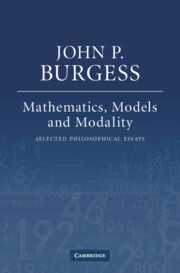Book contents
- Front matter
- Contents
- Preface
- Source notes
- Introduction
- PART I MATHEMATICS
- PART II MODELS, MODALITY, AND MORE
- 8 Tarski's tort
- 9 Which modal logic is the right one?
- 10 Can truth out?
- 11 Quinus ab omni naevo vindicatus
- 12 Translating names
- 13 Relevance: a fallacy?
- 14 Dummett's case for intuitionism
- Annotated bibliography
- References
- Index
11 - Quinus ab omni naevo vindicatus
Published online by Cambridge University Press: 22 September 2009
- Front matter
- Contents
- Preface
- Source notes
- Introduction
- PART I MATHEMATICS
- PART II MODELS, MODALITY, AND MORE
- 8 Tarski's tort
- 9 Which modal logic is the right one?
- 10 Can truth out?
- 11 Quinus ab omni naevo vindicatus
- 12 Translating names
- 13 Relevance: a fallacy?
- 14 Dummett's case for intuitionism
- Annotated bibliography
- References
- Index
Summary
QUINE'S CRITIQUE
Quine and his critique
Today there appears to be a widespread impression that W. V. Quine's notorious critique of modal logic, based on certain ideas about reference, has been successfully answered. As one writer put it some years ago: “His objections have been dead for a while, even though they have not yet been completely buried.” What is supposed to have killed off the critique? Some would cite the development of a new “possible-worlds” model theory for modal logics in the 1960s; others, the development of new “direct” theories of reference for names in the 1970s.
These developments do suggest that Quine's unfriendliness towards any formal logics but the classical, and indifference towards theories of reference for any singular terms but variables, were unfortunate. But in this study I will argue, first, that Quine's more specific criticisms of modal logic have not been refuted by either of the developments cited, and further, that there was much that those who did not share Quine's unfortunate attitudes might have learned about modality and about reference by attention to that critique when it first appeared, so that it was a misfortune for philosophical logic and philosophy of language that early reactions to it were as defensive and uncomprehending as they generally were.
- Type
- Chapter
- Information
- Mathematics, Models, and ModalitySelected Philosophical Essays, pp. 203 - 235Publisher: Cambridge University PressPrint publication year: 2008
- 2
- Cited by



